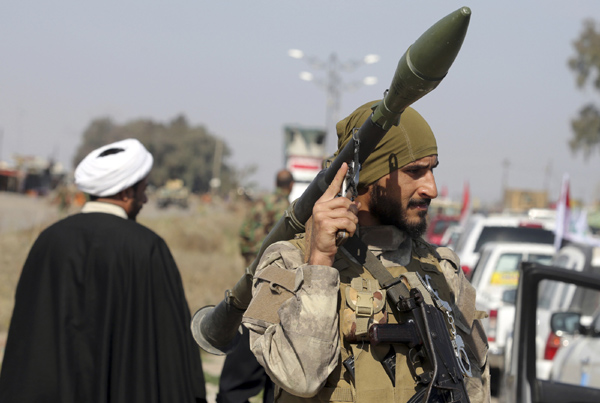Kiwi opposition blasts troop deployment to Iraq
(Xinhua) Updated: 2015-02-24 13:54
 |
|
An Iraqi Shi'ite fighter holds a rocket-propelled grenade launcher as they prepare to launch an attack on Islamic State militants on the outskirts of the city of Tikrit February 18, 2015.[Photo/Agencies] |
WELLINGTON - Opposition lawmakers Tuesday accused the New Zealand government of lacking a mandate in its controversial decision to deploy troops to Iraq to help in the fight against Islamic State (IS) insurgents.
Legislators were scathing of Prime Minister John Key's decision to deny them a vote on the move, which would have highlighted the divisions as two of the government's three minor-party coalition partners came out against the deployment.
In a widely broadcast statement to the parliament, Key confirmed that up to 143 New Zealand troops would be deployed in a two-year "military training mission" to Iraq from May as part of the international coalition against the IS.
Key said in his statement that New Zealand's military personnel would fulfill a non-combat, "behind-the-wire" mission to train Iraqi Security Forces so they were better prepared to fight the IS.
However, the denial of a parliamentary vote was in contrast to New Zealand's last major military deployment when troops were sent to Afghanistan with the parliament's support in 2001.
Opposition parties said Key's government was undermining the country's independent foreign policy by joining the 62-nation U.S.- led coalition against IS, and exposing ordinary New Zealanders to the threat of a terrorist backlash.
Political leaders implied that Key had yielded to pressure from New Zealand's "Five Eyes" intelligence-sharing allies: the United States, Britain, Canada and Australia.
"We will not fix the Iraqi army and those whom we join up there, and it will not be the soldiers of 62 other nations, it will be five nations, who will not fix the army," leader of the main opposition Labor Party Andrew Little said in his published reply to Key.
The New Zealand government had ignored a request for help in civil reconstruction in Iraq, and turned its back on a unique opportunity for "moral leadership" to support the building a nation state, said Little.
Co-leader of the opposition Green Party Russel Norman said the lack of a vote made democracy "a military export not for domestic consumption."
"The government has no mandate to take our country to war. In doing so the prime minister is making New Zealand and New Zealanders unnecessary ISIL targets," Norman said in his published statement.
"We correctly stayed out of the 2003 Iraq war. It is ridiculous that 12 years later we are being dragged into its aftermath," he said.
"We should be using our seat on the United Nations Security Council to push for sanctions against nations that continue to supply arms and money to ISIL."






